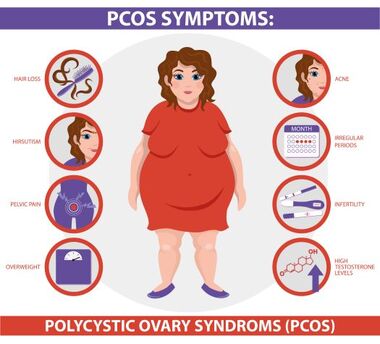|
Most women usually have a period every 28 days. However, a healthy menstrual cycle can range from every 21 to 35 days. Women usually start their periods around age 12, although some can start earlier or later. Menstrual periods are often irregular during the early years, because it may take several years for the hormones that control menstruation to reach stability.
The menstrual cycle is a result of a complex interaction between the ovaries and the brain. Anything that interferes with this interaction can stop the body from ovulating and may lead to a missed period. There are many reasons why a woman may miss her usual monthly period, or why her periods could stop completely; some common causes are listed below. Tip: 1 Pregnancy You guessed it; the most common reason for a missed period is pregnancy. If you are having unprotected sex then you may have missed your period because you are pregnant. Additionally, there is always a small chance that your contraception method has failed. Doing a home pregnancy test is a quick, cheap and convenient way to help you determine whether you are pregnant or not. Tip: 2 Birth Control If you are using birth control or a contraceptive method that involves hormones then you may experience a change in your menstrual cycle. Some types of contraception such as the progesterone-only pill, the contraceptive injection, contraceptive implants, the vaginal ring or the intrauterine system (IUS) particularly Mirena, can cause your periods to stop entirely. However, your periods should return after coming off these types of birth control. Tip: 3 Stress Stress can cause your menstrual cycle to become longer, shorter or even more painful and can also stop your period totally. Stress can affect the hormones in the body that are responsible for ovulation and menstruation. Some stress management techniques include relaxing more often and exercising regularly. If you feel you are going through an overwhelming situation you can consider counseling to help you decide how to cope with the issues that are causing you stress. Tip: 4 BODY WEIGHT Obesity Being overweight or obese can affect your menstrual cycle. The excess body weight produces excess estrogen, which can cause irregular periods and can also cause your period to stop completely. Weight loss can help to regulate the menstrual cycle of women who are obese. Low Body weight Being severely underweight interferes with regular menstrual cycles as well. Women with eating disorders such as anorexia nervosa or bulimia may experience missed periods. The lack of body fat and other nutrients can affect the production of hormones involved in menstruation. Normally, weight gain helps your periods to return. Tip: 5 Sudden Weight Loss or Extreme Exercise Excessive or sudden weight loss can cause your periods to stop. Severely restricting the amount you eat stops the production of hormones needed for ovulation and menstruation. Additionally, excessive exercise and intense physical activity can cause hormone imbalances, which may cause your periods to stop. It takes strenuous exercise for hours every day to produces these hormonal changes. (If you are an athlete planning on exercising for hours every day, be sure to see a sports medicine doctor to prevent athletic amenorrhea.) Tip: 6 Polycystic Ovarian Syndrome (PCOS) PCOS is a very common reproductive condition. Polycystic ovaries contain a large number of follicles, which are sacs in which eggs grow. In PCOS, these sacs are often unable to release an egg, and so ovulation does not take place. PCOS results in relatively high and sustained levels of hormones, rather than the fluctuating levels seen in the normal menstrual cycle. As a result women with PCOS may have missed periods or have fewer periods. There is no cure for PCOS but the symptoms can be managed using a combination of treatments that include medication. Tip: 7 Menopause As you approach menopause the estrogen levels in the body will start to drop, and you may ovulate less often. This may lead to irregular periods and occasionally missed periods. After the menopause, your periods will stop completely. The menopause is a natural part of the ageing process in women and usually occurs between the ages of 45 and 55. I hope that these tips on “7 REASONS WHY YOU MAY HAVE MISSED YOUR PERIOD” were helpful. Remember; YOUR HEALTH IS INVALUABLE. By Dr. J. Lawarna Matthew Acknowledgements The Society of Obstetricians and Gynecologists of Canada Office of Women’s Health (womenshealth.gov) Visit the websites below for more information https://www.yourperiod.ca/abnormal-pain-and-menstrual-bleeding/irregular-or-absent-periods/ https://www.womenshealth.gov/a-z-topics/polycystic-ovary-syndrome (Image credits: Fertility center of Dallas)
0 Comments
Leave a Reply. |
AuthorDr. J. Lawarna Matthew Archives
January 2021
Categories |

 RSS Feed
RSS Feed
